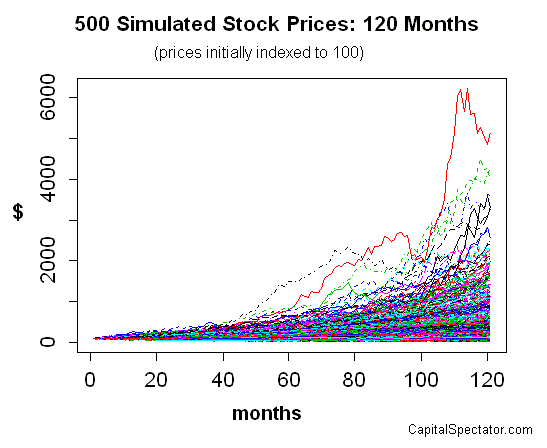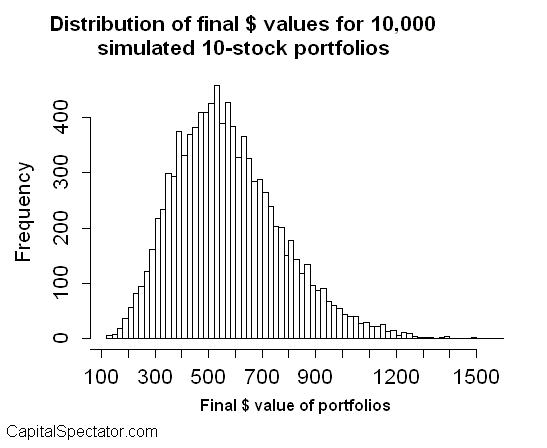Thanks to yesterday’s annual meeting for Berkshire Hathaway Inc (BRKa), it’s the high season once again for admiring Warren Buffett’s stellar investing record. The praise is certainly justified. The company’s stock has risen by roughly 20% a year over nearly five decades, convincingly outperforming the US stock market by a wide margin. As The Economist notes, “someone who invested $1000 at the outset would now have more than $10m, compared to around $100,000 if they had invested the same amount of money in the S&P 500.”
Buffett’s investing record is widely attributed to skill, and there’s enough evidence to back up the claim. But as an intellectual exercise, it’s interesting to consider the influence of dumb luck, if any. Although Berkhire’s success is linked to factors behind picking stocks, quite a lot of the praise over the years is bound up with his track record in buying shares of publicly traded companies, such as Coca-Cola Enterprises Inc. (NYSE:CCE) and American Express Company (NYSE:AXP). In fact, one of the reasons why Berkshire’s performance has been head and shoulders over the US stock market is Buffett’s success in building a concentrated portfolio of companies. That’s no trivial factor in looking for explanations for his performance triumph. If you’re intent on beating the market, some degree of concentration is necessary. But that raises the question: what are the odds for success with a concentrated portfolio? More to the point, how much of Berkshire’s performance is a function of a concentrated investment portfolio?
The tailwind that arises from the simple choice of opting for concentration may be stronger than casual observation suggests. For one thing, there’s a generally rising tide of success when it comes to stocks generally, as shown by the positive returns in US equities overall. As a result, it’s difficult to choose a portfolio of losers across the board when growth is the bias. What are the odds of beating the S&P 500 by randomly choosing 10 stocks from the index? In search of an answer, or at least some perspective, let’s kick around some numbers with a basic simulation analysis in R.
First, let’s generate a data set of 500 returns with randomly generated prices that have annualized volatility ranging from 1% to 10% and expected annual returns of zero to 30%. After setting the initial prices to 100, here’s how our fake set of 500 stocks compares across a time period of 10 years (120 months):
As expected, there are a few big winners, a handful of dogs, and a dominant pool of stocks that fall primarily in the middle of those extremes. Now let’s randomly generate 10,000 buy-and-hold portfolios (based on a normal distribution), each reflecting a different mix of 10 stocks from this simulated data set. (By the way, that’s a small fraction of the total number of unique 10-stock portfolios that are possible in a universe of 500 companies.) Assuming that all the portfolios start with an initial price of $100, the end values are spread far and wide, ranging from no change (a final dollar value of $100) up to around $1,600. The average is around $600.
In other words, sheer luck suggests that you’d have a pretty good chance of earning average to above average returns by randomly choosing 10 stocks out of a field of 500. That’s a high-risk strategy in terms of real-world investing, of course, but the results lay the foundation for thinking that you can do well with a passive indexing strategy.
Far be it from me to suggest that Buffett’s results are due to luck. On the other hand, how many success stories should we expect to find if 10,000 monkeys randomly picked 10-stock portfolios from the S&P 500? A surprisingly high number, as it turns out.
The lesson here is that if you assume that a rising economic tide will lift most equity prices over time, you don’t have to be a genius to earn an average to above-average return. In other words, it helps to fish in a productive pool of companies. Yes, a highly skilled manager is worth his weight in gold, but such talents are the exception to the rule. Even worse, it’s hard to identify true investing talent in advance. Fortunately, you can still do pretty well by hitching your investment wagon to the market. Unless, of course, you’re confident that you’ve identified the next Warren Buffett for the next 40 years… today. Buffett, however, recommends another path, which is to say that he tells us to do as he says and not as he’s done. Writing in Berkshire’s 2013 letter to shareholders, the Oracle of Omaha offers some rather pedestrian investment advice:
My advice to the trustee couldn’t be more simple: Put 10% of the cash in short-term government bonds and 90% in a very low-cost S & P 500 index fund. (I suggest Vanguard’s.) I believe the trust’s long-term results from this policy will be superior to those attained by most investors — whether pension funds, institutions or individuals — who employ high-fee managers.


